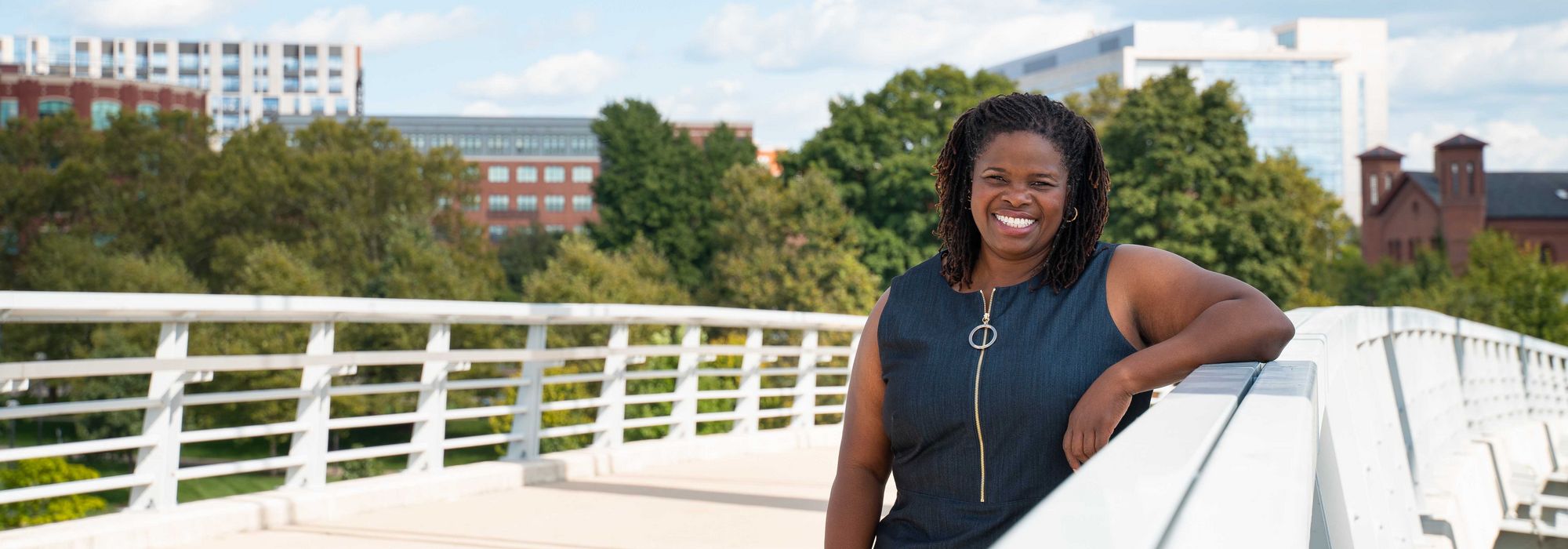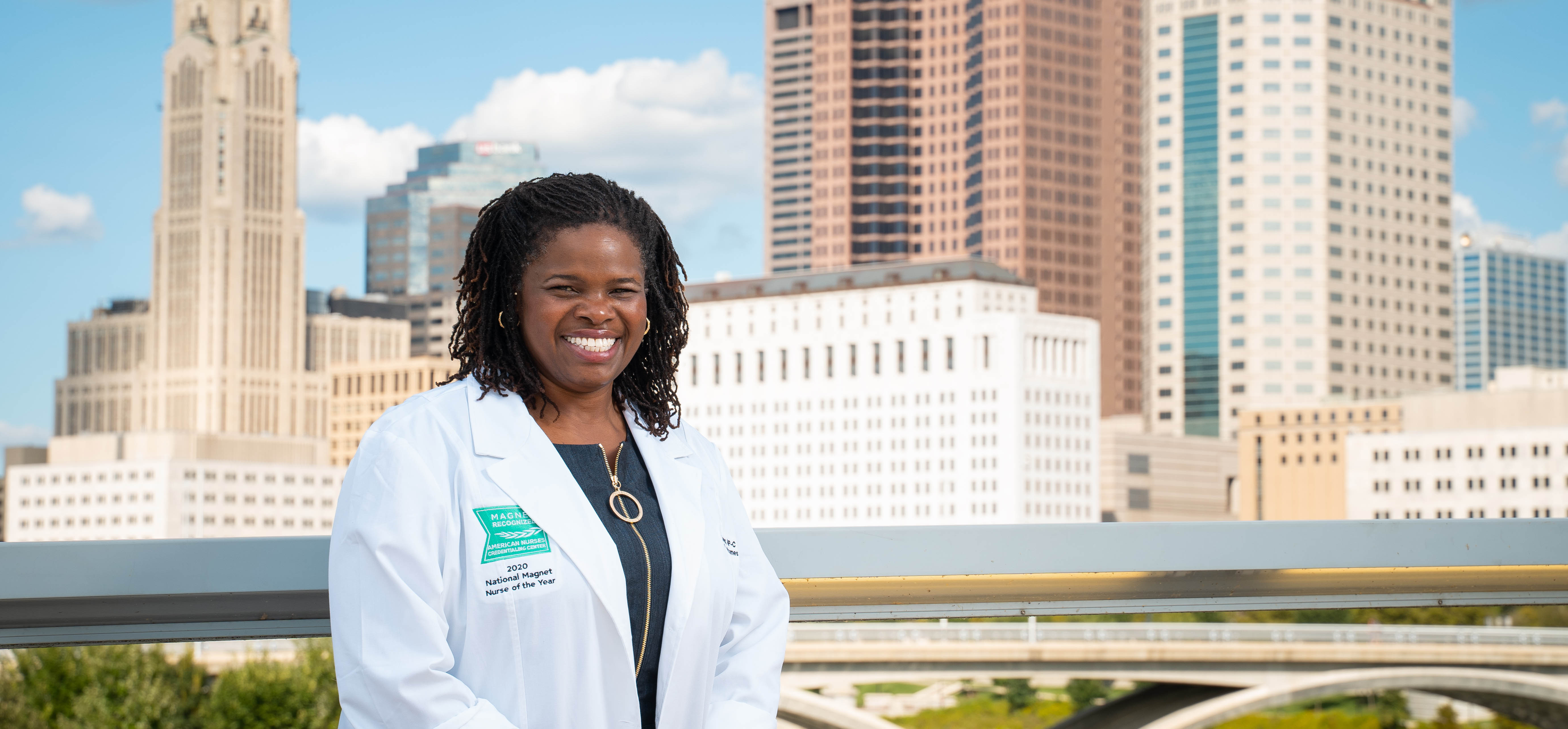
Denise Williams
Alumna Denise Williams provides care with compassion
by Susan Neale
The first things you will notice about Denise Williams, MS, CNP, (’95,’15 MS) are her warm smile and wonderful laugh. She makes you feel right at home wherever you are. That’s a vital skill at OhioHealth Grant Medical Education Clinics, Transitions of Care Clinic (TCC), where many patients are in the middle of a healthcare crisis. Williams is the advanced practice nurse for the TCC, which provides bridge care for (primarily) OhioHealth patients without regular healthcare providers who have developed chronic conditions or just come from the Emergency Department (ED) with acute issues. They might be uninsured or facing financial difficulties on top of their medical issues. They are often very emotional and confused.
“A lot of times, they cry. Or they’re mad – ‘How could this happen to me? I’ve been healthy all my life!’” Williams said. “They finally release all of this emotion that’s been building up, and in being able to talk to them on their level we can build quite a rapport.” Williams, who has three degrees from Ohio State and years of practice as a nurse, says her real expertise is “being able to sit down with the patient.”
Magnet Nurse of the Year

In May, Williams was awarded the American Nurses Credentialing Center (ANCC) 2020 Magnet Nurse of the Year Award for Empirical Outcomes.
Melissa Kline, DNP, MetroHealth chief nursing officer and member of ANCC’s Commission on Magnet Recognition, who introduced Williams at the awards ceremony, commended Williams for the many ways she has improved patient outcomes at TCC. “Over the past year, her work resulted in not one patient leaving the clinic without being seen. 90% of patients did not return for an ED visit within 30 days and 93% of patients did not require inpatient readmission within 30 days. Williams puts patients first,” Kline said. She also praised Williams’ work to streamline patient referrals to the TCC and prioritize follow-up with high-risk patients to reduce readmissions over the past five years.
“My goal is to empower patients to figure out, to learn what it is their disease is, when they do need to go and when they don’t need to go [to the ED],” Williams said. “That’s the part of outcomes that I’m proud of: patients being empowered, that they are able to troubleshoot what’s going on, and if they can’t, they have someone to reach out to who can help them in that situation.”
Her patient care includes calling patients after visits to make sure they understand their treatment plan and their diagnosis. Being fluent in Spanish helps her communicate with many patients, too.
Building bridges with Spanish
When Williams was a little girl in Brooklyn, NY, she was fascinated by the Spanish she often heard in her community and from her relatives from Panama. At her elementary school, daily class announcements were printed in both Spanish and English, so she used the Spanish notes for practice each morning. As she grew adept, she found her way into bilingual classes.
Her father’s job with AEP moved them to Worthington, Ohio, when she was 11, and “It was night and day different from Brooklyn,” Williams said, but then with her characteristic laughter, “we made it work.” She pursued a minor in Spanish while majoring in nursing at Ohio State.
Feeling a need for a change from nursing 20 years ago, she returned to Ohio State for a master’s in education – Spanish language, literacy and culture; an experience that included going to the Dominican Republic as an exchange student. Williams taught middle school Spanish for a year before realizing she couldn’t stay away from nursing. A lifelong learner, she later went back to Ohio State again for a Master’s in Nursing, Adult Gerontology Primary Care.
“In the TCC I have the privilege of talking with my patients on a different level – one that takes the real world into account.”
– Denise Williams
Compassion at the core
About her years of studying Spanish and her detour into teaching, Williams said, “You need to have those other things outside of nursing – that’s what makes us grounded. That’s what makes us able to take care of patients who come from all walks of life.”
“To be a nurse,” she said, “You have to have that compassionate part at the core. And in order to take care of that compassion, you have to be able to bring in all of those other things from the rest of the world.”
Williams also once seriously considered attending medical school to become a doctor. Her first job in nursing at Doctor’s North Hospital’s open heart step down and med/surg unit changed her mind, though. “Seeing patients who are literally broken become able to walk around the unit and then be able to take care of themselves … that was just amazing to me,” she said. When a patient’s daughter thanked her for taking care of her father and giving him ice cream, Williams realized the profound effect of everyday acts of caring, and decided nursing was where she was supposed to be.
“We have a different angle from doctors,” Williams said, “and I like that angle.”
In this issue
- Diane Von Ah: Solving Cancer Care Puzzles
- Faye Wattleton: Committed to Women's Health
- Amanda Parker: Finding the Light Within
- Publications with Passion
- New Grants Roundup
- Building Update
- Advancing EBP: Clinicians Dare to Dream
- Bridge Care: Denise Williams
- Student Mental Health Initiatives
- Student Life: Back to Campus
- Health Equity Scholars
- Young Alumni Blog
- Homecoming
- Connie Gallaher: Paying it Forward
- Virtual Trails
